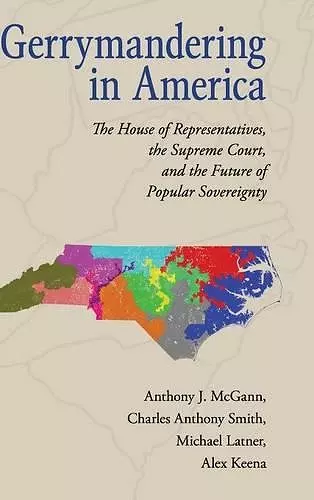Gerrymandering in America
The House of Representatives, the Supreme Court, and the Future of Popular Sovereignty
Charles Anthony Smith author Alex Keena author Michael Latner author Anthony J McGann author
Format:Hardback
Publisher:Cambridge University Press
Published:4th Apr '16
Currently unavailable, and unfortunately no date known when it will be back
This hardback is available in another edition too:
- Paperback£30.99(9781316507674)

This book provides a standard to gauge partisan gerrymandering, which increased after the Supreme Court ruled it a non-justiciable issue.
This book will appeal to anyone interested in elections, the Supreme Court, Congress, or equality grounded on the Constitution. When the Supreme Court decided partisan gerrymandering was beyond judicial oversight, it radically altered the constraints on redistricting and allowed for greater partisan bias.This book considers the political and constitutional consequences of Vieth v. Jubelirer (2004), where the Supreme Court held that partisan gerrymandering challenges could no longer be adjudicated by the courts. Through a rigorous scientific analysis of US House district maps, the authors argue that partisan bias increased dramatically in the 2010 redistricting round after the Vieth decision, both at the national and state level. From a constitutional perspective, unrestrained partisan gerrymandering poses a critical threat to a central pillar of American democracy, popular sovereignty. State legislatures now effectively determine the political composition of the US House. The book answers the Court's challenge to find a new standard for gerrymandering that is both constitutionally grounded and legally manageable. It argues that the scientifically rigorous partisan symmetry measure is an appropriate legal standard for partisan gerrymandering, as it logically implies the constitutional right to individual equality and can be practically applied.
'Under what circumstances can minorities defeat majorities in American democracy? Blending incisive legal analysis, with insights from social choice theory, McGann, Smith, Latner, and Keena explain how a largely unnoticed court case has allowed the Republican Party to violate the fundamental democratic principle of one man one vote to ensure their control of the House of Representatives. Employing rigorous empirical analysis, the authors provide a death-blow to political scientists' prevailing wisdom that, when it comes to redistricting, demography is destiny … Important, accessible, and timely, this book will generate controversy among scholars of redistricting. It is essential reading for students of American politics, as well as anyone who wants to better understand today's political climate.' Benjamin G. Bishin, University of California, Riverside
'[This book] makes a rigorously argued case that partisan gerrymandering - unrestricted after Vieth v. Jubelirer (2004) - has emerged as a serious problem for democratic representation and proposes to solve it through an innovative legal strategy, rooted in social choice theory, designed to persuade courts to reconsider the issue from a new perspective. It is easily the most original and important work on partisan gerrymandering to appear since the Court's ruling.' Gary Jacobson, University of California, San Diego
'Translating votes into a fair division of seats is a fundamental challenge of democracy. The authors powerfully demonstrate how the Supreme Court's 5-4 decision in Vieth v. Jubelirer (2004) set the stage for at least a decade of partisan gerrymanders and systematic bias in favor of Republicans.' Matthew Lebo, State University of New York, Stony Brook
'McGann et al. explain how partisan gerrymandering allowed a minority of voters to elect a majority of the US House of Representatives in 2012 and created a virtual Republican lock on the institution until 2020. The authors make a provocative argument about the signal sent by the Supreme Court's Vieth v. Jubelirer decision, which they claim encouraged state legislatures to maximize partisan advantage in competitive states … This book represents the best of social science research by addressing a relevant topic, embracing normative implications for democratic theory, and offering guidelines to ensure popular sovereignty.' T. Lynch, Choice
'… this is an excellent book. The authors do a tremendous job covering the legal background and political implications of gerrymandering and explaining the data analysis required for the book. … I highly recommend this book to students and scholars of representation and redistricting.' Thomas L. Brunell, Congress and the Presidency
ISBN: 9781107143258
Dimensions: 238mm x 152mm x 21mm
Weight: 500g
268 pages